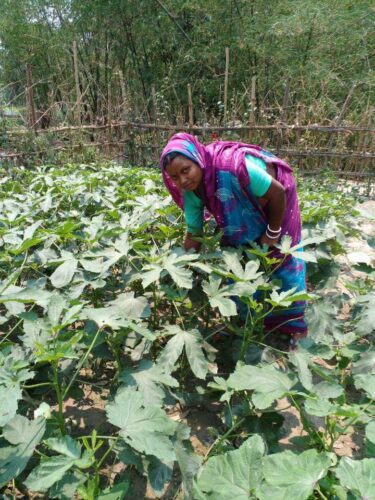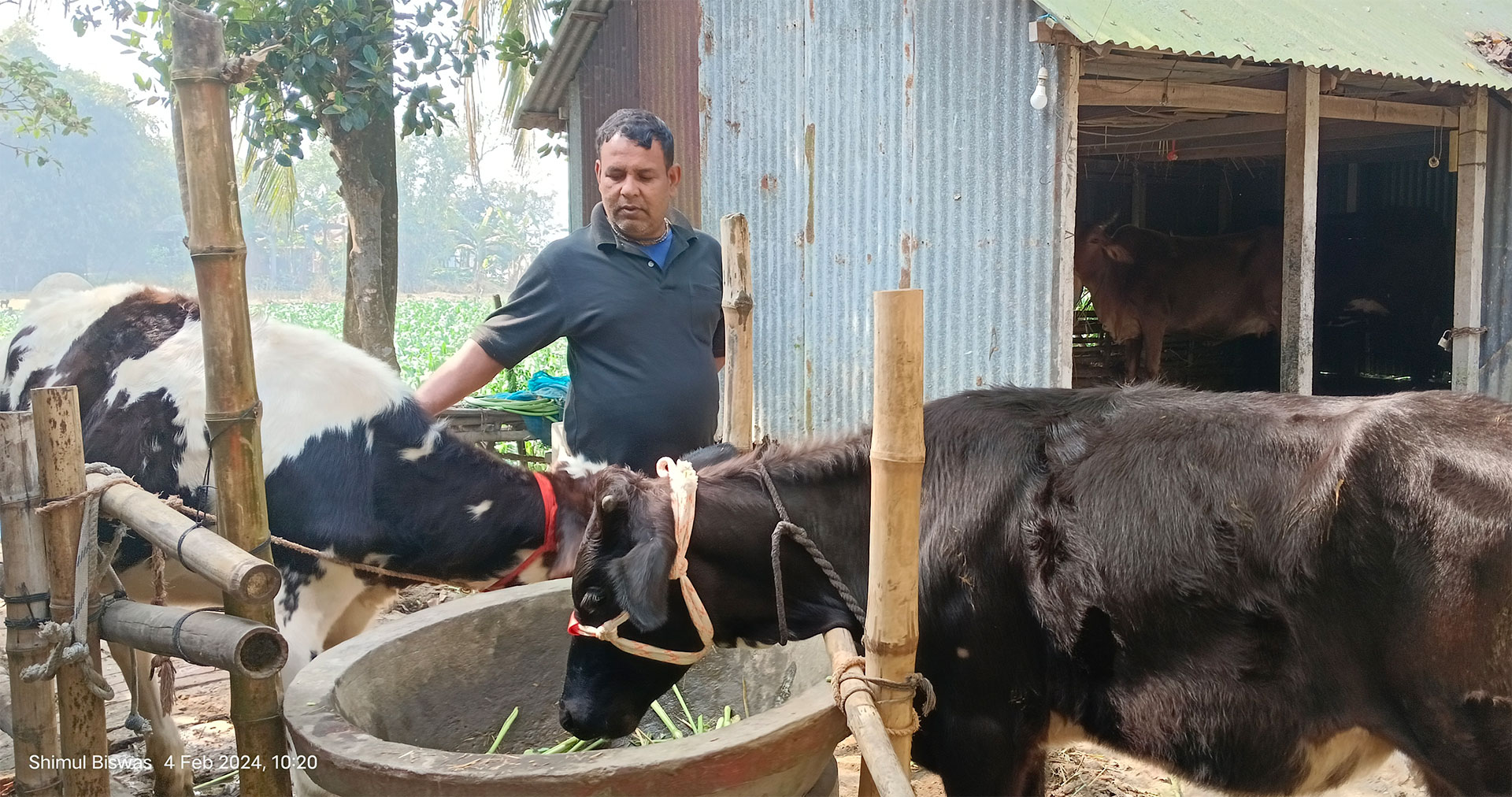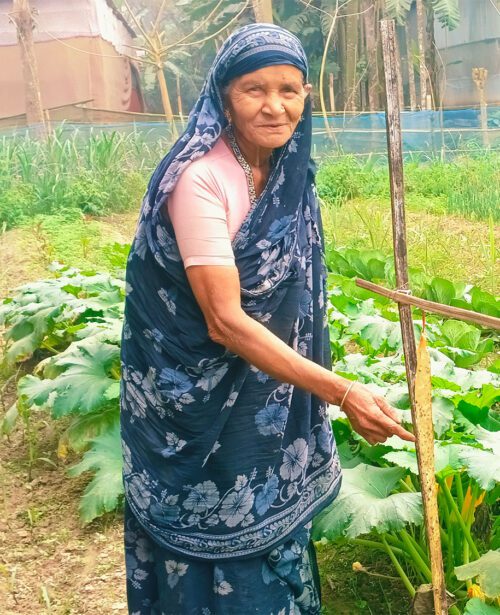“Nature no longer behaves as it used to. Over the course of her long life as a farmer, 60-year-old Krishani Rahima Begum of Nayabari village of Singair upazila has witnessed the climate changing in Bangladesh. In the past her country enjoyed six seasons; now there are only three–summer, monsoon, and winter.
It’s a massive shift that brings severe impacts affecting everyone, and she feels small farmers like her, who depend on nature and have scarce resources, face the worst of it. Unpredictable weather patterns mean no longer knowing when the rains will come and for how long, if at all. Foggy weather conditions can cause discoloration, stunting, and withering of harvests, while extreme heat and flash floods are certain to decimate crops labored over carefully. “Nature is misbehaving,” is how she puts it.
Resilience from Harmony
Amidst uncertain times and the now-constant “misbehavior” from nature, it is the farmer’s experiential knowledge of working with their environment rather than against it, of harmony and regeneration rather than poison and domination that the Bangladesh Resource Center for Indigenous Knowledge (BARCIK) fosters among its facilitating farmers like Rahima Bagum to allow them to make adaptive measures.
Rahima Begum joined the Naya Bari Krishak Krishan organization, and along with other farmers used her intimate knowledge of nature’s cycles and processes along with training offered by BARCIK to undertake diverse production and make the most of her 35 decimals of homestead land (equivalent to a third of an acre).
The couple makes their own organic manure and pesticides, allowing them to use what is readily available from their farm. To them this eliminates the need to spend their funds on these expensive inputs that, apart from lessening one’s income from farming, also disrupts the critical balance and interdependence in the various living ecosystems that are necessary for their household and farm’s resilience.
She and her husband can continue to grow diverse, seasonal crops and rear livestock to provide food for their family throughout the year, while earning some cash from their surplus harvest.
Resilience from Courage and Will
 Neela Rani and her husband Girish of the coastal village of Abad Chandipur in the south-western coastal similarly found agroecological farming as a way to ensure food for their family throughout the year. Even with their meager resources and no access to fresh water, relying instead on tube well water and often encountering salinity in their cultivable land due to shrimp cultivation in the area, she and her husband are able to grow various kinds of fruits and vegetables as well as rice and livestock
Neela Rani and her husband Girish of the coastal village of Abad Chandipur in the south-western coastal similarly found agroecological farming as a way to ensure food for their family throughout the year. Even with their meager resources and no access to fresh water, relying instead on tube well water and often encountering salinity in their cultivable land due to shrimp cultivation in the area, she and her husband are able to grow various kinds of fruits and vegetables as well as rice and livestock
“Cultivation of these crops does not cost much. It just needs courage and will,” Neela Rani shares –her simple insight a testament to the transformative power of agroecology for peasant farming communities that techno-fixes often diminish by reducing farming challenges to questions of efficiencies and innovations, stripped of human, social, and political dimensions.
Courage and will are no easy feats when the industrial, chemical dependent way of producing food is the dominant practice. But these personal and social values of courage and will are able to take root given agroecology builds spaces and fosters conditions for farmers to grow their agency and autonomy over their production in the face of constraints and challenges.
Positioning farmers as key agents of change in the food system and building their power, agroecology’s potential not just for farm resilience but also psychosocial resilience especially during the climate emergency cannot be underestimated and in fact requires further attention.
These days Neela Rani sells the surplus crops and vegetables after meeting their family’s needs, which helps her to earn cash. She uses the cash to meet the various expenses of her family and saves the rest for the future. She said, “We, husband and wife, grow vegetables together at home. If you produce diverse crops you do not need to buy a lot of vegetables from the market. We are now happy and financially a bit solvent by cultivation of diverse crops maximizing the use of our lands.”
Resilience from Ongoing Learning
Swapan Roy, a farmer from Manikganj with a 30-decimal homestead, used to buy all the agricultural inputs he needed for his production from the village market. When he joined the farmers’ organization Casta Barowari that was facilitated by BARCIK, he gained knowledge and skills about environment-friendly, sustainable, natural resource-based agricultural management and met farmers from whom he learned successful practices.
Initially he thought of trying to make his production inputs himself, being that agriculture was his only source of income. He started conserving seeds of local varieties at home, processing cow dung for manure, preparing organic pesticides for pest control, and planting marigolds on land isles. Incorporating indigenous methods as he farms his 30-decimal homestead and exercising control over his production resources, Swapan Roy noticed that his thinking and his practices in agriculture started to change.
He arranged his production according to the micro ecosystems in his farm, learning and adapting along the way. Near his house, in a low lying piece of land, he cultivated a diversity of crops like cauliflower, cabbage, radish, red cabbage, cucumber, sweet pumpkin, brinjal, spinach, corn, as well as medicinal plants. At the loft of his house he grew gourds, beans, and rice. Various species of native fish thrive in an adjacent pond, and both he and his wife share the work of rearing livestock using indigenous knowledge. After consulting with BARCIK, he is currently experimenting on using surface water from his pond rather than extracting underground water during the dry season.
Building Community Resilience
Both Rahima Begum and Neela Rani have learned to conserve the seeds of their crops, allowing them to create a seed bank in their respective farms that they share with other farmers in the community who face seed crises at no cost, using it as opportunities to underscore the importance of being able to protect their own genetic resources.

According to BARCIK, Swapan Roy’s farm is like an agroecological learning center where everything is managed in an environmentally friendly way, reusing and recycling farm wastes enabling him and his family members to collect almost all types of fresh and poison-free foods. Visiting their farm, there is so much to learn and to share because of how agroecology practices have been able to foster the farmer’s scientific and creative mind to approach challenges on the ground, which serves to inspire farmers like him.
BARCIK’s initiative stands as a beacon of hope amidst the challenges posed by climate change for many farmers in Bangladesh. Through fostering agroecological practices and community resilience, BARCIK empowers farmers like Rahima Begum, Neela Rani, and Swapan Roy to thrive despite uncertain environmental conditions. By promoting sustainable methods and knowledge-sharing, BARCIK not only enhances food sovereignty but also cultivates a sense of solidarity and empowerment within farming communities. BARCIK’s efforts exemplify the transformative potential of grassroots initiatives in building a resilient future for agriculture.
(Adapted with permission from the feature articles written by Shimul Biswas from Manikganj, and Protima Rani from Satkhira, and translated by Silvanus Lamin originally published in the BARCIK website)”


